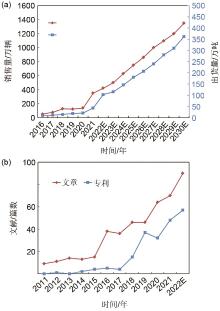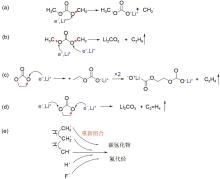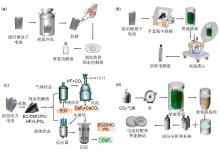Energy Storage Science and Technology ›› 2022, Vol. 11 ›› Issue (9): 2798-2810.doi: 10.19799/j.cnki.2095-4239.2022.0338
• Special Issue for the 10th Anniversary • Previous Articles Next Articles
Qunbin ZHANG1( ), Tao DONG2, Jingjing LI1, Yanxia LIU1,2, Haitao ZHANG1,2(
), Tao DONG2, Jingjing LI1, Yanxia LIU1,2, Haitao ZHANG1,2( )
)
Received:2022-06-20
Revised:2022-06-30
Online:2022-09-05
Published:2022-08-30
Contact:
Haitao ZHANG
E-mail:qbzhang@ipezz.ac.cn;htzhang@ipe.ac.cn
CLC Number:
Qunbin ZHANG, Tao DONG, Jingjing LI, Yanxia LIU, Haitao ZHANG. Research progress on the recovery and high-value utilization of spent electrolyte from lithium-ion batteries[J]. Energy Storage Science and Technology, 2022, 11(9): 2798-2810.

Fig. 1
(a) Annual sales volume of domestic new energy vehicles and domestic electrolyte shipments from 2016 to 2030. Note: the data are from intelligent research information; (b) Statistics of articles and related patents related to electrolyte recovery of lithium ion batteries from 2011 to 2022. (data source: CNKI)"


Fig. 4
Reduction processes of DMC and EC: (a) one-electron nucleophilic attack reaction of DMC; (b) two-electron nucleophilic attack reaction of DMC; (c) one-electron nucleophilic attack reaction of EC; and (d) two-electron nucleophilic attack reaction of EC; (e) formation pathways of hydrocarbons and fluorohydrocarbons[21]"


Fig. 7
Enrichment method of electrolyte: (a) Technical route of freezing method; (b) Recovery of electrolyte by mechanical centrifugation[29]; (c) Technical route of electrolyte recovery by solvent method[33] (d) Schematic diagram of electrolyte recovery by supercritical carbon dioxide method[34]"

| 1 | GOODENOUGH J B, PARK K S. The Li-ion rechargeable battery: A perspective[J]. Journal of the American Chemical Society, 2013, 135(4): 1167-1176. |
| 2 | KIM T H, PARK J S, CHANG S K, et al. The Current move of lithium ion batteries towards the next phase[J]. Advanced Energy Materials, 2012, 2(7): 860-872. |
| 3 | HUANG B, PAN Z F, SU X Y, et al. Tin-based materials as versatile anodes for alkali (earth)-ion batteries[J]. Journal of Power Sources, 2018, 395: 41-59. |
| 4 | YI T F, WEI T T, LI Y, et al. Efforts on enhancing the Li-ion diffusion coefficient and electronic conductivity of titanate-based anode materials for advanced Li-ion batteries[J]. Energy Storage Materials, 2020, 26: 165-197. |
| 5 | FAN E S, LI L, WANG Z P, et al. Sustainable recycling technology for Li-ion batteries and beyond: Challenges and future prospects[J]. Chemical Reviews, 2020, 120(14): 7020-7063. |
| 6 | WU F X, MAIER J, YU Y. Guidelines and trends for next-generation rechargeable lithium and lithium-ion batteries[J]. Chemical Society Reviews, 2020, 49(5): 1569-1614. |
| 7 | CHIANG Y M. Building a better battery[J]. Science, 2010, 330(6010): 1485-1486. |
| 8 | ZHAO X Y, LEHTO V P. Challenges and prospects of nanosized silicon anodes in lithium-ion batteries[J]. Nanotechnology, 2021, 32(4): 042002. |
| 9 | ZHANG Q B, LIAO J, LIAO M, et al. One-dimensional Fe7S8@C nanorods as anode materials for high-rate and long-life lithium-ion batteries[J]. Applied Surface Science, 2019, 473: 799-806. |
| 10 | WU Y A, NG A W, YU Z C, et al. A review of evolutionary policy incentives for sustainable development of electric vehicles in China: Strategic implications[J]. Energy Policy, 2021, 148: 111983. |
| 11 | ARSHAD F, LI L, AMIN K, et al. A comprehensive review of the advancement in recycling the anode and electrolyte from spent lithium ion batteries[J]. ACS Sustainable Chemistry & Engineering, 2020, 8(36): 13527-13554. |
| 12 | 赵永锋, 张海涛. 高纯六氟磷酸锂晶体产业化制备工艺研究进展[J]. 过程工程学报, 2018, 18(6): 1160-1166. |
| ZHAO Y F, ZHANG H T. Preparation process of high-quality LiPF6 crystals[J]. The Chinese Journal of Process Engineering, 2018, 18(6): 1160-1166. | |
| 13 | 张晓妍, 任宇飞, 高洁, 等. 动力电池电解液用添加剂的研究进展[J]. 储能科学与技术, 2018, 7(3): 404-417. |
| ZHANG X Y, REN Y F, GAO J, et al. Progress of electrolyte additives for high-capacity power lithium ion batteries[J]. Energy Storage Science and Technology, 2018, 7(3): 404-417. | |
| 14 | TIKEKAR M D, CHOUDHURY S, TU Z Y, et al. Design principles for electrolytes and interfaces for stable lithium-metal batteries[J]. Nature Energy, 2016, 1: 16114. |
| 15 | KWABI D G, JI Y L, AZIZ M J. Electrolyte lifetime in aqueous organic redox flow batteries: A critical review[J]. Chemical Reviews, 2020, 120(14): 6467-6489. |
| 16 | PENDER J P, JHA G, YOUN D H, et al. Electrode degradation in lithium-ion batteries[J]. ACS Nano, 2020, 14(2): 1243-1295. |
| 17 | WANG Q S, JIANG L H, YU Y, et al. Progress of enhancing the safety of lithium ion battery from the electrolyte aspect[J]. Nano Energy, 2019, 55: 93-114. |
| 18 | WANG C, XING L D, VATAMANU J, et al. Overlooked electrolyte destabilization by manganese (II) in lithium-ion batteries[J]. Nature Communications, 2019, 10: 3423. |
| 19 | AURBACH D, ZABAN A, EIN-ELI Y, et al. Recent studies on the correlation between surface chemistry, morphology, three-dimensional structures and performance of Li and Li-C intercalation anodes in several important electrolyte systems[J]. Journal of Power Sources, 1997, 68(1): 91-98. |
| 20 | WANG C, XING L D, VATAMANU J, et al. Overlooked electrolyte destabilization by manganese (II) in lithium-ion batteries[J]. Nature Communications, 2019, 10: 3423. |
| 21 | LIAO Z H, ZHANG S, ZHAO Y K, et al. Experimental evaluation of thermolysis-driven gas emissions from LiPF6-carbonate electrolyte used in lithium-ion batteries[J]. Journal of Energy Chemistry, 2020, 49: 124-135. |
| 22 | HUANG B, PAN Z F, SU X Y, et al. Recycling of lithium-ion batteries: Recent advances and perspectives[J]. Journal of Power Sources, 2018, 399: 274-286. |
| 23 | LIU P. Recycling waste batteries: Recovery of valuable resources or reutilization as functional materials[J]. ACS Sustainable Chemistry & Engineering, 2018, 6: doi: acssuschemeng.8b03495. |
| 24 | SVEN L. The values & benefits of Umicore's process excellence model[J]. Precious Metals, 2012, 33(A01): 6. |
| 25 | MESHRAM P, PANDEY B D, MANKHAND T R. Extraction of lithium from primary and secondary sources by pre-treatment, leaching and separation: A comprehensive review[J]. Hydrometallurgy, 2014, 150: 192-208. |
| 26 | MU D Y, LIU Y L, LI R H, et al. Transcritical CO2 extraction of electrolytes for lithium-ion batteries: Optimization of the recycling process and quality-quantity variation[J]. New Journal of Chemistry, 2017, 41(15): 7177-7185. |
| 27 | 順谷都市. 非水性溶剂体系电池的处理方法: JP11167936A[P]. 1998-03-11. |
| SHUN GU D S. Treatment method of non-aqueous solvent system battery: JP11167936A[P]. 1998-03-11. | |
| 28 | 赵煜娟, 孙玉成, 纪常伟, 等. 一种废旧锂离子电池电解液回收处理方法: CN103825065B[P]. 2016-11-16. |
| ZHAO Y J, SUN Y C, JI C W, et al. Method for recovering and processing waste and old lithium ion battery electrolyte: CN103825065B[P]. 2016-11-16. | |
| 29 | 严红. 废旧锂离子电池电解液的回收方法: CN104282962B[P]. 2017-03-08. |
| YAN H. Method for recovering electrolytes from waste/used lithium ion batteries: CN104282962B[P]. 2017-03-08. | |
| 30 | HE K, ZHANG Z Y, ALAI L G, et al. A green process for exfoliating electrode materials and simultaneously extracting electrolyte from spent lithium-ion batteries[J]. Journal of Hazardous Materials, 2019, 375: 43-51. |
| 31 | 杨中德, 金会鹏, 于永成. 电解液回收装置: CN208990308U[P]. 2019-06-18. |
| YANG Z D, JIN H P, YU Y C. Electrolyte recovery device: CN208990308U[P]. 2019-06-18. | |
| 32 | 赖延清, 张治安, 闫宵林. 一种废旧锂电池电解液处理方法: 201710115795[P]. 2017-02-28. |
| LAI Y Q, ZHANG Z A, YAN X L. An electrolyte treatment method for waste lithium battery: 201710115795[P]. 2017-02-28. | |
| 33 | ZHU Y B, DING Q, ZHAO Y M, et al. Study on the process of harmless treatment of residual electrolyte in battery disassembly[J]. Waste Management & Research, 2020, 38(11): 1295-1300. |
| 34 | GRÜTZKE M, KRAFT V, WEBER W, et al. Supercritical carbon dioxide extraction of lithium-ion battery electrolytes[J]. The Journal of Supercritical Fluids, 2014, 94: 216-222. |
| 35 | LAIN M J. Recycling of lithium ion cells and batteries[J]. Journal of Power Sources, 2001, 97/98: 736-738. |
| 36 | 林浩志, 平田浩一郎, 鹤卷英范, 等. 含氟电解液的处理方法: CN105594056A[P]. 2014-09-24. |
| 37 | 张锁江, 张鹏飞, 徐松, 等. 一种废旧锂离子电池电解液全回收方法: CN110203949B[P]. 2021-10-26. |
| 38 | 陈夏雨. 一种锂离子电池电解液回收方法: CN105390765A[P]. 2016-03-09. |
| CHEN X Y. Recovery method for electrolyte solution of lithium ion battery: CN105390765A[P]. 2016-03-09. | |
| 39 | 赵煜娟, 孙玉成, 纪常伟, 等. 一种废旧硬壳动力锂离子电池电解液置换装置及置换方法: CN103825063B[P]. 2017-01-04. |
| ZHAO Y, SUN Y, JI C, et al. Waste and old hard-case power lithium ion battery electrolyte displacement apparatus and displacement method thereof: CN103825063B[P]. 2017-01-04. | |
| 40 | SHARIF K M, RAHMAN M M, AZMIR J, et al. Experimental design of supercritical fluid extraction-A review[J]. Journal of Food Engineering, 2014, 124: 105-116. |
| 41 | STEVEN E SLOOP. System and method for removing an electrolyte from an energy storage and/or conversion device using a supercritical fluid: EP1472756 A1[P]. 2008-11-06. |
| 42 | MÖNNIGHOFF X, FRIESEN A, KONERSMANN B, et al. Supercritical carbon dioxide extraction of electrolyte from spent lithium ion batteries and its characterization by gas chromatography with chemical ionization[J]. Journal of Power Sources, 2017, 352: 56-63. |
| 43 | ROTHERMEL S, EVERTZ M, KASNATSCHEEW J, et al. Graphite recycling from spent lithium-ion batteries[J]. ChemSusChem, 2016, 9(24): 3473-3484. |
| 44 | 周立山, 刘红光, 叶学海, 等. 一种回收废旧锂离子电池电解液的方法: CN102496752A[P]. 2012-06-13. |
| ZHOU L S, LIU H G, YE X H, et al. Method for recycling electrolyte of waste lithium ion battery: CN102496752A[P]. 2012-06-13. | |
| 45 | 王学真. 一种从废旧锂电池正极材料中回收六氟磷酸锂的方法: CN108288737B[P]. 2020-01-03. |
| 46 | 曾桂生, 凌波, 魏栖梧, 等. 一种废旧锂电池中回收六氟磷酸锂的方法: CN109292746A[P]. 2019-02-01. |
| ZENG G S, LING B, WEI Q W, et al. Method for recovering lithium hexafluorophosphate in waste lithium battery: CN109292746A[P]. 2019-02-01. | |
| 47 | 温丰源, 刘海霞, 李霞. 废旧锂离子电池材料中电解液的回收处理方法[J]. 河南化工, 2016, 33(8): 12-14, 29. |
| WEN F Y, LIU H X, LI X. Recovery treatment method of electrolyte in waste lithium ion battery materials[J]. Henan Chemical Industry, 2016, 33(8): 12-14, 29. | |
| 48 | 刘权坤, 陈艳丽, 滑晨, 等. 一种废旧锂离子电池电解液回收再利用的方法: CN110620276B[P]. 2022-06-17. |
| 49 | 胡家佳, 王晨旭, 曹利娜. 一种废旧锂离子电池中六氟磷酸锂回收方法: CN106025420A[P]. 2016-10-12. |
| HU J J, WANG C X, CAO L N. Method for recovering lithium hexafluorophosphate in waste lithium ion battery: CN106025420A[P]. 2016-10-12. | |
| 50 | LAIN M J. Recycling of lithium ion cells and batteries[J]. Journal of Power Sources, 2001, 97/98: 736-738. |
| 51 | 李荐, 何帅, 周宏明. 一种废旧锂离子电池电解液回收方法: CN104600392A[P]. 2015-05-06. |
| LI J, HE S, ZHOU H M. Method for recovering electrolyte of waste lithium ion battery: CN104600392A[P]. 2015-05-06. | |
| 52 | 钟琍菁, 林冠佑, 王儀婷, 等. 锂的回收方法: CN113086994A[P]. 2021-07-09. |
| ZHONG L J, LIN G Y, WANG Y T, et al. Method for recovering lithium: CN113086994A[P]. 2021-07-09. | |
| 53 | 王金锋, 张万红. Method for recycling lithium from lithium-containing battery: CN106654437B[P]. 2020-02-18. |
| 王金锋, 张万红. 从含锂电池中回收锂的方法: CN106654437B[P]. 2020-02-18. | |
| 54 | 蒋达金. 一种废旧六氟磷酸锂的资源化利用方法: CN111498878A[P]. 2020-08-07. |
| JIANG D J. Resource utilization method of waste lithium hexafluorophosphate: CN111498878A[P]. 2020-08-07. | |
| 55 | 霍爱群, 王一飞, 毛国柱. 一种回收处理废旧锂电池电解液及电解液废水的处理方法: 104628217B[P]. 2016-09-07. |
| HUO A Q, WANG Y F, MAO G Z. A treatment method for recycling waste lithium battery electrolyte and electrolyte wastewater:104628217B[P]. 2016-09-07. | |
| 56 | BEN T, JONATHAN P. Recovery of compounds from Li-ion battery electrolyte: EP2410603A1[P]. 2012-01-25. |
| 57 | WANG W, CHEN W J, LIU H T. Hydrometallurgical preparation of lithium carbonate from lithium-rich electrolyte[J]. Hydrometallurgy, 2019, 185: 88-92. |
| 58 | MCLAUGHLIN W, ADAMS T S. Li reclamation process: US5888463[P]. 1999-03-30. |
| 59 | 崔宏祥, 王志远, 徐宁. 一种废旧锂离子电池电解液的无害化处理工艺及装置: CN101397175[P]. 2009-04-01. |
| CUI H X, WANG Z Y, XU N. A harmless treatment process and device for waste lithium ion battery electrolyte: CN101397175[P].2009-04-01. | |
| 60 | 张俊喜, 刘蔚, 王昆仑. A method for recycle that electrolyte of waste battery: CN109193062B[P]. 2021-04-02. |
| 张俊喜, 刘蔚, 王昆仑. 一种废旧电池电解液回收利用方法: CN109193062B[P]. 2021-04-02. | |
| 61 | 徐斌, 齐爱, 张建飞, 等. 一种废次锂离子电池电解液的处理再利用方法: CN109216824A[P]. 2019-01-15. |
| XU B, QI A, ZHANG J F, et al. A method for treating and reusing waste sublithium ion battery electrolyte: CN109216824A[P]. 2019-01-15. | |
| 62 | 邵俊华, 张建飞, 闫国锋, 等. 一种锂电池电解液回收处理的方法: CN110867624A[P]. 2020-03-06. |
| SHAO J H, ZHANG J F, YAN G F, et al. Lithium battery electrolyte recycling method: CN110867624A[P]. 2020-03-06. | |
| 63 | 张勇耀, 项文勤, 赵卫娟, 等. 废旧锂离子电池电解液回收研究[J]. 浙江化工, 2018, 49(8): 12-15, 19. |
| ZHANG Y Y, XIANG W Q, ZHAO W J, et al. Research situation of waste lithium-ion battery electrolyte recycling[J]. Zhejiang Chemical Industry, 2018, 49(8): 12-15, 19. | |
| 64 | LI S, ZHANG S Q, SHEN L, et al. Progress and perspective of ceramic/polymer composite solid electrolytes for lithium batteries[J]. Advanced Science, 2020, 7(5): 1903088. |
| [1] | Pengbo ZHAI, Dongmei CHANG, Zhijie BI, Ning ZHAO, Xiangxin GUO. Research progress on key interfacial issues in lithium lanthanum zirconium oxide-based solid-state [J]. Energy Storage Science and Technology, 2022, 11(9): 2847-2865. |
| [2] | Jun ZHANG, Qi LI, Ying TAO, Quanhong YANG. Sieving carbons for sodium-ion batteries: Origin and progress [J]. Energy Storage Science and Technology, 2022, 11(9): 2825-2833. |
| [3] | Jinghua WU, Jing YANG, Gaozhan LIU, Zhiyan WANG, Zhihua ZHANG, Hailong YU, Xiayin YAO, Xuejie HUANG. Review and prospective of solid-state lithium batteries in the past decade (2011—2021) [J]. Energy Storage Science and Technology, 2022, 11(9): 2713-2745. |
| [4] | Jing ZHU, Yida WU, Junfeng HAO, Guanjun CEN, Ronghan QIAO, Xiaoyu SHEN, Mengyu TIAN, Hongxiang JI, Zhou JIN, Yuanjie ZHAN, Yong YAN, Liubin BEN, Hailong YU, Yanyan LIU, Xuejie HUANG. Reviews of selected 100 recent papers for lithium batteries (Jun. 1, 2022 to Jul. 31, 2022) [J]. Energy Storage Science and Technology, 2022, 11(9): 3035-3050. |
| [5] | Xiaoyu SHEN, Guanjun CEN, Ronghan QIAO, Jing ZHU, Hongxiang JI, Mengyu TIAN, Zhou JIN, Yong YAN, Yida WU, Yuanjie ZHAN, Hailong YU, Liubin BEN, Yanyan LIU, Xuejie HUANG. Reviews of selected 100 recent papers for lithium batteries (Apr. 1, 2022 to May 31, 2022) [J]. Energy Storage Science and Technology, 2022, 11(7): 2007-2022. |
| [6] | Sida HUO, Wendong XUE, Xinli LI, Yong LI. Visualization analysis of composite electrolytes for lithium battery based on CiteSpace [J]. Energy Storage Science and Technology, 2022, 11(7): 2103-2113. |
| [7] | Yingwei PEI, Hong ZHANG, Xinghui WANG. Recent advances in the electrolytes of rechargeable zinc-ion batteries [J]. Energy Storage Science and Technology, 2022, 11(7): 2075-2082. |
| [8] | OU Yu, HOU Wenhui, LIU Kai. Research progress of smart safety electrolytes in lithium-ion batteries [J]. Energy Storage Science and Technology, 2022, 11(6): 1772-1787. |
| [9] | YAN Qiaoyi, WU Feng, CHEN Renjie, LI Li. Recovery and resource recycling of graphite anode materials for spent lithium-ion batteries [J]. Energy Storage Science and Technology, 2022, 11(6): 1760-1771. |
| [10] | ZHOU Weidong, HUANG Qiu, XIE Xiaoxin, CHEN Kejun, LI Wei, QIU Jieshan. Research progress of polymer electrolyte for solid state lithium batteries [J]. Energy Storage Science and Technology, 2022, 11(6): 1788-1805. |
| [11] | LI Yitao, SHEN Kaier, PANG Quanquan. Advance in organics enhanced sulfide-based solid-state batteries [J]. Energy Storage Science and Technology, 2022, 11(6): 1902-1918. |
| [12] | ZHOU Wei, FU Dongju, LIU Weifeng, CHEN Jianjun, HU Zhao, ZENG Xierong. Research progress on recycling technology of waste lithium iron phosphate power battery [J]. Energy Storage Science and Technology, 2022, 11(6): 1854-1864. |
| [13] | Ronghan QIAO, Guanjun CEN, Xiaoyu SHEN, Mengyu TIAN, Hongxiang JI, Feng TIAN, Wenbin QI, Zhou JIN, Yida WU, Yuanjie ZHAN, Yong YAN, Liubin BEN, Hailong YU, Yanyan LIU, Xuejie HUANG. Reviews of selected 100 recent papers for lithium batteries (Feb. 1, 2022 to Mar. 31, 2022) [J]. Energy Storage Science and Technology, 2022, 11(5): 1289-1304. |
| [14] | Chaochao WEI, Chuang YU, Zhongkai WU, Linfeng PENG, Shijie CHENG, Jia XIE. Research progress of Li3PS4 solid electrolyte [J]. Energy Storage Science and Technology, 2022, 11(5): 1368-1382. |
| [15] | Zhicheng CHEN, Zongxu LI, Ling CAI, Yisi LIU. Development status and future prospects of flexible metal-air batteries [J]. Energy Storage Science and Technology, 2022, 11(5): 1401-1410. |
| Viewed | ||||||
|
Full text |
|
|||||
|
Abstract |
|
|||||
